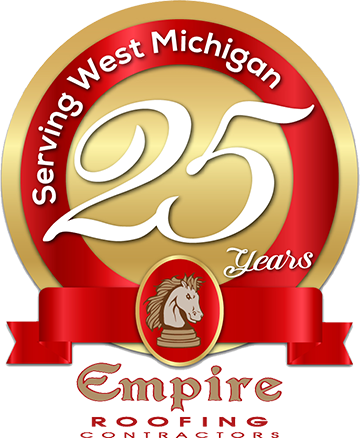
The commercial roofing industry continues to evolve rapidly in 2025, driven by technological innovations, sustainability demands, and changing business needs. Several key trends are reshaping the commercial roofing services building owners need to consider when approaching commercial roofing projects.
In the Muskegon, MI region, call on Empire Contractors for innovative solutions to all your commercial roofing needs; 231-861-7221.
Leading Commercial Roofing Services
Sustainable Materials and Energy Efficiency
Environmental considerations remain at the forefront of commercial roofing decisions. Cool roofing technologies have advanced significantly, with new materials offering superior heat reflection and improved building energy efficiency. Recycled and bio-based roofing materials are gaining widespread adoption, particularly in urban areas with strict environmental regulations. Plant-based waterproofing membranes and recycled rubber roofing products are seeing increased market share, offering both environmental benefits and competitive performance metrics.
Drone Technology and AI-Assisted Inspections
The use of drones equipped with high-resolution cameras and thermal imaging capabilities has become standard practice for roof inspections. These aerial surveys, combined with artificial intelligence analysis, provide detailed roof assessments with unprecedented accuracy. AI algorithms can now detect potential failure points and aging patterns, allowing for more precise maintenance planning and cost projections.
Modular and Prefabricated Solutions
As labor costs continue to rise and project timelines tighten, modular roofing systems are gaining popularity. These pre-manufactured components arrive ready to install, reducing on-site labor requirements and installation time. Prefabricated roofing elements also offer more consistent quality control and can be designed to precise specifications, including integrated solar panels and drainage systems.
Enhanced Weather Resistance
Climate resilience has become a critical factor in commercial roofing design. New composite materials and installation techniques are being developed to withstand more extreme weather conditions, from intense heat waves to severe storms. Impact-resistant membranes and advanced waterproofing systems are becoming standard features, particularly in regions prone to severe weather events.
Solar Integration and Energy Generation

Building-integrated photovoltaics (BIPV) have evolved beyond simple solar panel installations. New thin-film solar materials can be directly incorporated into roofing membranes, turning entire roof surfaces into power generation systems. Energy storage solutions are increasingly being integrated into roofing systems, allowing buildings to maximize their solar energy utilization.
Digital Documentation and Project Management
The digitalization of roofing projects has accelerated, with building information modeling (BIM) becoming standard practice. Digital twins of roofing systems allow for better maintenance planning and renovation strategies. Mobile apps and cloud-based platforms have streamlined project management, improving communication between contractors, suppliers, and building owners.
Focus on Life-Cycle Costs
Building owners are increasingly evaluating roofing solutions based on total life-cycle costs rather than just initial installation expenses. This shift has led to greater adoption of premium materials and systems that offer better long-term value through reduced maintenance needs and extended service life. Manufacturers are responding with more comprehensive warranty programs and maintenance support services.
Your Local Commercial Roofing Experts
The commercial roofing industry continues to embrace innovation while focusing on sustainability and efficiency. As we progress through 2025, these trends are expected to accelerate, driven by technological advancements and evolving client needs. Building owners and contractors who stay ahead of these trends will be better positioned to make informed decisions about their roofing investments and maintain competitive advantages in their respective markets.
To learn more, or to schedule a consultation for your Muskegon, MI commercial building, please call our experts today at 231-861-7221.
Frequently Asked Questions
Q What is the most cost-effective commercial roofing solution in 2025?
A Smart roofing systems with predictive maintenance capabilities typically offer the best long-term value. While initial costs may be higher, these systems reduce maintenance expenses and extend roof lifespan through early problem detection and prevention. Integration with building management systems further optimizes energy efficiency, leading to additional cost savings.
Q How long do modern commercial roofs last?
A With proper maintenance and modern materials, commercial roofs installed in 2025 can last 20-30 years. Smart monitoring systems and advanced materials have significantly extended the average lifespan compared to traditional roofing systems. However, actual durability depends on factors like local climate, maintenance frequency, and the specific materials used.
Q Are sustainable roofing materials as durable as traditional options?
A Yes, modern sustainable roofing materials match or exceed the performance of traditional materials. Advances in recycled and bio-based materials have produced options that offer excellent durability while reducing environmental impact. Many sustainable materials now come with warranties comparable to conventional products.
Q How can building owners prepare for smart roofing installation?
A Building owners should start by assessing their current infrastructure’s compatibility with smart systems, including network connectivity and building management systems. Working with experienced contractors who understand both roofing and technology integration is crucial. Planning should include considerations for data security and system scalability.
Q Do solar-integrated roofs require special maintenance?
A While solar-integrated roofing systems require some specialized maintenance, modern systems are designed for minimal upkeep. Regular cleaning and inspection of electrical components are typically sufficient. Many systems now include self-diagnostic capabilities that alert owners to potential issues before they affect performance.
Q What is the ROI timeline for smart roofing systems?
A Most building owners see a return on investment within 5-7 years through reduced energy costs, lower maintenance expenses, and extended roof lifespan. Properties with smart roofing systems often command higher rental rates and property values, further improving ROI.
A How are drone inspections changing the roofing industry?
A Drone inspections have revolutionized roof maintenance by providing safer, more detailed, and cost-effective inspection options. Combined with AI analysis, these inspections can identify potential issues earlier and create more accurate maintenance records. This technology has reduced inspection costs while improving the quality and frequency of roof assessments.
